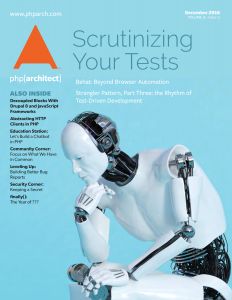Behat: Beyond Browser Automation
Read this article for FREE
Behat is a tool written in PHP to support teams in practicing Behavior-driven Development. In its simplest form, it is a test automation tool which focuses on comprehensibility more than it does on validity. Behat provides you with a simple developer-agnostic language—Gherkin, and then gives you automation capabilities on top of it. Gherkin’s semantic flexibility is both its biggest asset and its biggest flaw. by Konstantin Kudryashov
Strangler Pattern, Part Three: the Rhythm of Test-Driven Development
Test-driven Development (TDD) would seem to be all about the tests. But if you focus on writing the tests, you miss most of the value. In my experience, TDD can take two to three times longer in initial development time. The most-often-stated value comes from the dramatically-reduced debugging time needed with production deployment. However, TDD’s greatest value comes in the future. Software must remain agile, open to change. The Rhythm of TDD, often called “red-green-refactor,” provides that value. Let’s introduce Test-driven Development with a focus on building future value. by Edward Barnard
Abstracting HTTP Clients in PHP
Many PHP applications are designed as server applications which receive a request and return a response to the client. However, PHP is also used to write API clients. This can be CLI tools written in PHP or server applications which need to talk to another system over HTTP. In this article, we’ll look at a library to abstract out the HTTP client used in your code to keep it flexible and future-proof. by David Buchmann
Decoupled Blocks with Drupal 8 and JavaScript Frameworks
The ongoing JavaScript renaissance is changing the web, and it is affecting the PHP development ecosystem in big ways. The days of sprucing up your UX with a few lines of jQuery are largely behind us, and the gaining popularity of fully decoupled architectures may mean PHP teams are only getting half of the build projects. Of course, that’s just part of the story, and the reality is PHP isn’t going anywhere anytime soon. A talented PHP developer looking to build the best possible experience for their users will inevitably end up looking at ways to integrate these two technologies sooner or later. by Matt Davis
Education Station: Let’s Build a Chatbot in PHP
I’m going to celebrate the time Christmas should be; a time of relaxing, when we all have some extra time on our hands. And what, as developers, do we do when we have some time on our hands? We write code. I’m going to step you through a fun project I built a little while ago. A chatbot. That’s right, a chatbot. What could be more fun than something you can, sort of, talk to; something you can ask a question of and receive an answer? by Matthew Setter
Leveling Up: Building Better Bug Reports
One of my favorite quotes about programming comes from Edsger W. Dijkstra. It says, “If debugging is the process of removing bugs, then programming must be the process of putting them in.” It indicates the maxim that as long as there is code, there will be bugs. Of course, we want to minimize the number of bugs in our code. Understanding what the desired behavior of our software is, and how that differs from the actual behavior is the key to understanding what the bug is and how to fix it. by David Stockton
Community Corner: Focus on What We Have in Common
For my U.S. friends, I did not vote the way you did. That statement is true for half of you. If that statement makes you angry, please read this. If you are nodding in agreement with me because you think you know me, please read this. by Cal Evans
Security Corner: Keeping A Secret
With any sufficiently advanced application comes a common piece of functionality—the need for sensitive credential handling. Sometimes, this comes in the form of user-related information (like a user’s password), and other times, it’s more related to sensitive values required by the code itself (like database connection information). Regardless of where this sensitive information comes from, the same absolute rule should be followed: protect it at all costs. by Chris Cornutt
The Year of ???
Once again, as the weather cools in the Northern Hemisphere, we become reflective of the year that has transpired. When looking back at 2016 for the PHP community, however, what do we find? by Eli White





